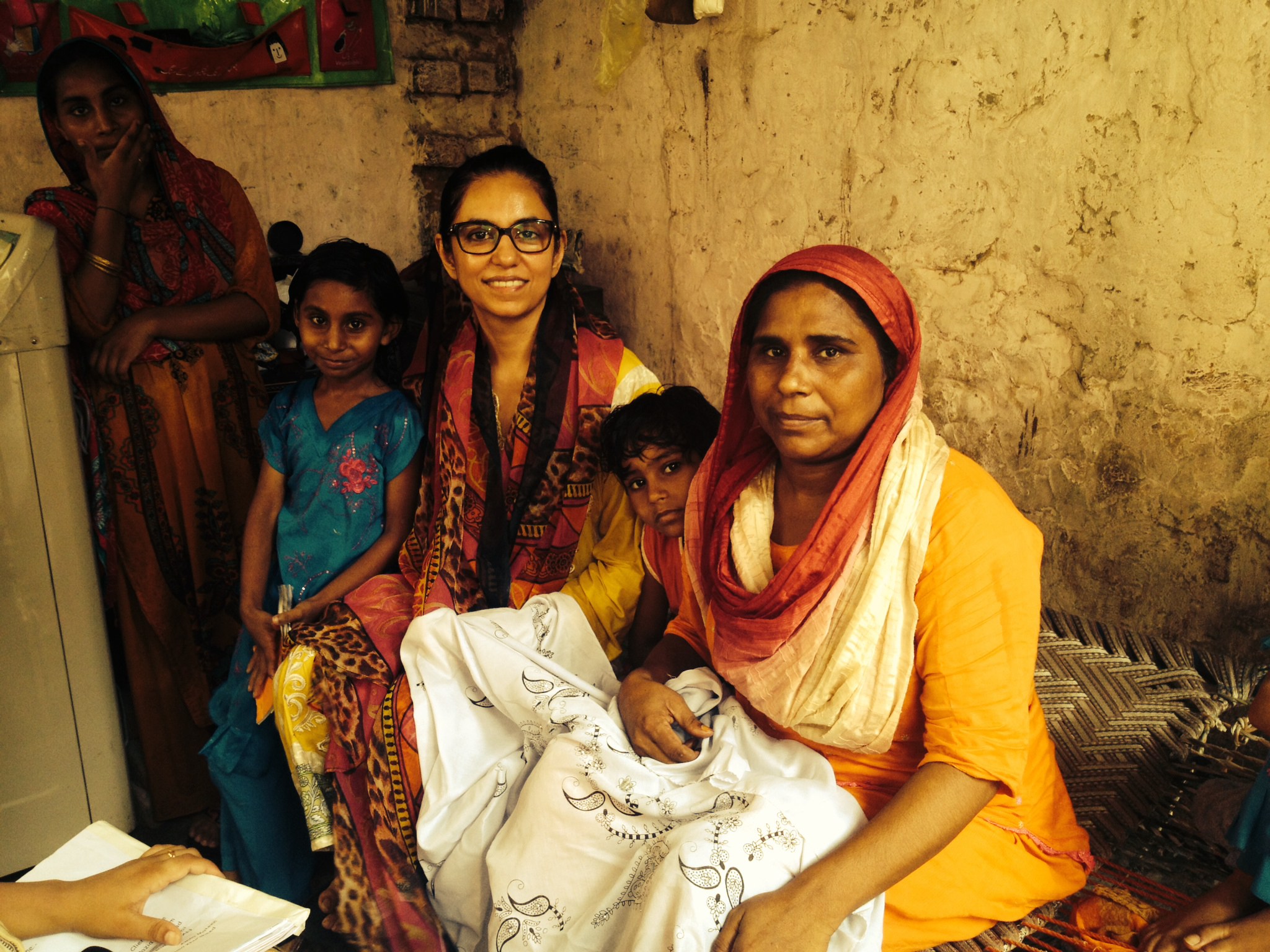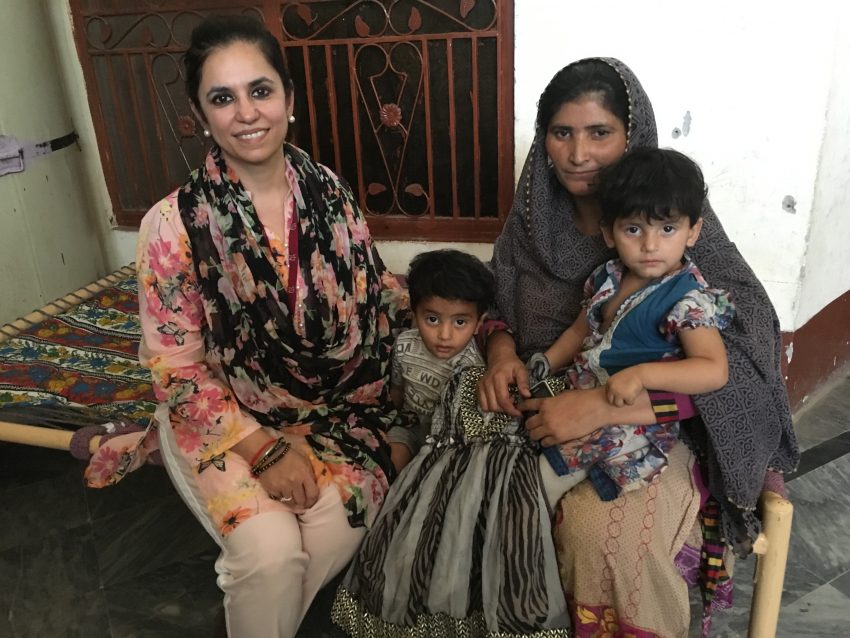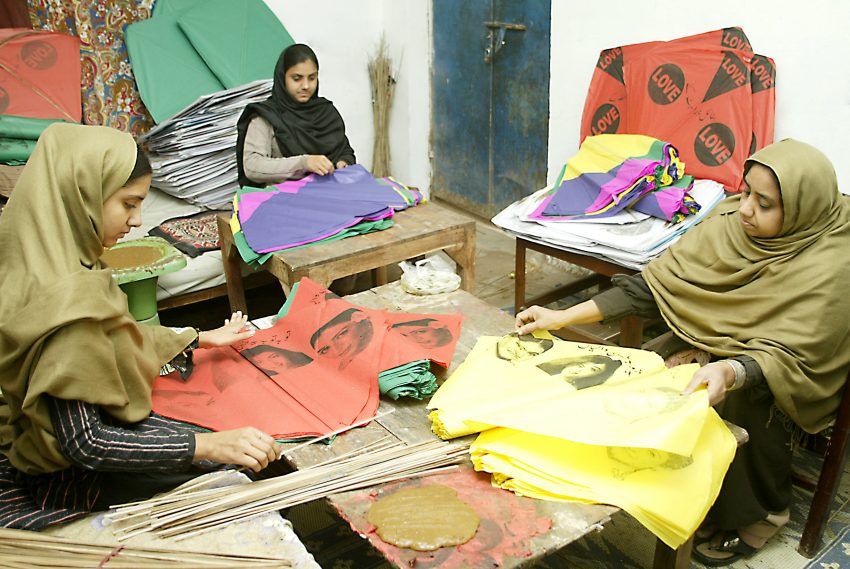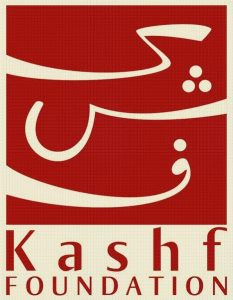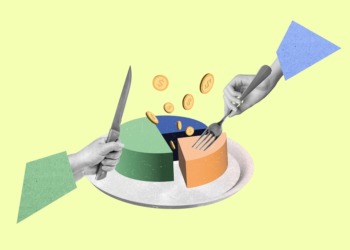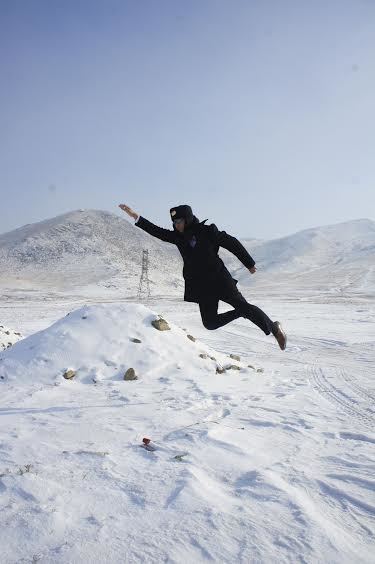SDG 5: Achieve gender equality and empower all women and girls
My work brings me in touch with the daily lives of women and girls living across low-income communities in Pakistan. Parveen Baji is one such dynamic female entrepreneur I met recently, who lives 15 kilometers outside the city of Sialkot in a small congested and run down slum. Sialkot is known for its economic vibrancy and women across the city are involved in producing footballs, gloves and other sporting goods. Parveen Baji is a master football producer and started learning this trade as a young girl from others in her community. Being the oldest amongst her siblings, her family had not invested in her education, as she was required to take care of her younger brothers and sisters.
She could not continue with her trade, as she was married at a very young age to a man much, much older than her, who had already been married before. This was the hardest time in her life as her husband not only denigrated her on a daily level, but also did not give her any financial support. This meant that often she would have to ask her parents for help; this situation continued for several years, until Parveen Baji’s first child – a son – was born. It was at this point that she decided to take things into her own hand and restart her football making business by seeking out a loan from Kashf, the organization I founded 20 years ago.
 In the Photo: Roshaneh Zafar (left) with Parveen Baji and her children. Photo Credit: Kashf Foundation
In the Photo: Roshaneh Zafar (left) with Parveen Baji and her children. Photo Credit: Kashf Foundation
Kashf was established in 1996 as Pakistan’s first specialized microfinance institution specifically targeting female micro-entrepreneurs. Kashf offers a suite of services in order to enable women to not only establish but to grow their businesses, while working on alleviating the challenges women led micro-businesses face. We currently offer enterprise loans twinned with business management and financial education trainings, along with other financial products like life insurance, health insurance and micro-savings.
The focus of the Kashf strategy is to enhance the capacity, the skills and the networks of the female entrepreneur, while also working with her family members to ensure their support. Keeping this in view Kashf also runs a gender sensitization programme along with public service campaigns to promote women’s economic role.
Parveen Baji’s journey was of course replete with many challenges, however, today she employs 15 other women in her business, and is producing dozens of hand stitched footballs every day. With a beaming face she told me “Earning an income has not only transformed my life but has enabled me to invest in my children. I am proud that I can afford to send all my children to school.”
Related article: “EMPOWERING WOMEN: THE SILVER BULLET TO ACHIEVING THE SDGS”
There is no doubt that the empowerment of women and girls is a very complex issue. Sharing the example above was a way of trying to unravel some aspects of this equation. And there is no doubt that the economic empowerment of women can provide opportunities for women to better themselves and their families. However, the odds are often piled sky high when it comes to gender equality.
In Parveen Baji’s case she was denied access to education, while her early marriage forced her further into a cycle of poverty and deprivation. Her social status in the family was at times no more than that of an unpaid maid, however, it was her will to survive that pushed her out of this trap and of course access to finance combined with a skill and contiguity to a market, allowed her to leverage her business opportunity.
… empowering women through access to finance was the easier part, it was convincing the men and the also the mother-in-laws about the value of women’s worth that was the more challenging aspect
In other words, what my experience of working with hundreds and thousands of women entrepreneurs has led me realize is that gender equality requires consistent and holistic interventions. Particularly it requires changing mindsets, which in most cases are determined by centuries of patriarchy. Often I have come across the notion that women’s earnings are not blessed, or a household relying on women’s income will not prosper. In our line of work, we realized that empowering women through access to finance was the easier part, it was convincing the men and the also the mother-in-laws about the value of women’s worth that was the more challenging aspect.
We had to think long and hard in terms of how to tackle this aspect, for many times even if a woman was able to earn an income, the control over how to use that additional income was not within her access. It became necessary to engage with communities in order to advocate the rights of women and girls.
Keeping this in mind, we developed several tools, including social theater, where we run community level performances on issues like violence against women, preferences for the male child, girl’s education, and more to start a community level dialogue on many of these issues.
 Photo Credit: Kashf Foundation
Photo Credit: Kashf Foundation
Another very effective tool that we have developed is undertaking gender trainings with males and young boys on gender roles and responsibilities and the need for economically engaging women as active partners in managing the family’s future. At the same time, we also invest in women’s financial management capacity by providing financial education and enterprise management trainings so that they can make better financial choices. There is also a need for positive role modeling for women, which we have tried to influence by running public service campaigns but with a twist.
In the past we have developed tele nouvelles or soap operas on television that highlight key social issues like child marriage, domestic violence, economic empowerment and child sexual abuse, to not only raise awareness on these issues but to provide solutions on how to tackle these both at the individual and at the level of the society. Our latest campaign on child sexual abuse in 2016 became one of the most popular drama serials in the country and was most watched despite its social and reality based story.
Related article: “SDG 5: ACHIEVING GENDER EQUALITY”
Empowering women also requires investing in leadership opportunities. Our approach is to improve women’s social and economic standing within their households, while also enabling them to build broader business level networks within their communities.
This particular aspect is critical in order to ensure the long term viability of women led businesses, for many times female enterprises flounder due to lack of access to markets and networks. As part of Kashf’s business enterprise training, female entrepreneurs are practically exposed to market negotiations through visits to markets, where they liaise with vendors and understand market demand for their products. 12 percent of women entrepreneurs who graduated from Kashf’s enterprise management trainings were able to establish sustained business linkages, which allowed them to substantially increase revenues and sales.
 Photo Credit: Kashf Foundation
Photo Credit: Kashf Foundation
The health and in particular reproductive health status of women, also impacts their empowerment and gender equality, as the high fertility burden takes a very heavy toll on women and children as well. There is no doubt that girls’ education is a great equalizer in terms of changing fertility dynamics, however, with low levels of female literacy that are prevalent in Pakistan women continue to be caregivers within their families and health contingencies often push women out of their economic role.
As an institution working to promote women’s empowerment and poverty alleviation, addressing health care was another important aspect for which we designed a women friendly health insurance product that covers the entire family for an amount of $1.50 per month for hospitalization. What we have seen in this product is that almost 50 percent of the claims were actually from females, which upon further investigation highlighted that often women under value their own health, and it was only after the health insurance cover that they addressed some of their primary health care issues. So empowerment can be both about changing attitudes, but also about providing sustainable access to women centric services.
… there is no doubt investing in the empowerment of women and girls is the right and the smart thing to do…
Over the past 20 years, we have worked with 1.5 million women entrepreneurs and their families, at times it is a journey of moving 5 steps forward and at others it has meant taking stock to provide new solutions to address old problems. However, there is no doubt investing in the empowerment of women and girls is the right and the smart thing to do, but it requires consistency, innovation and the will to change things around.
Recommended reading: “ROYA MAHBOOB IS FIGHTING TO EDUCATE THE GIRLS OF AFGHANISTAN”


